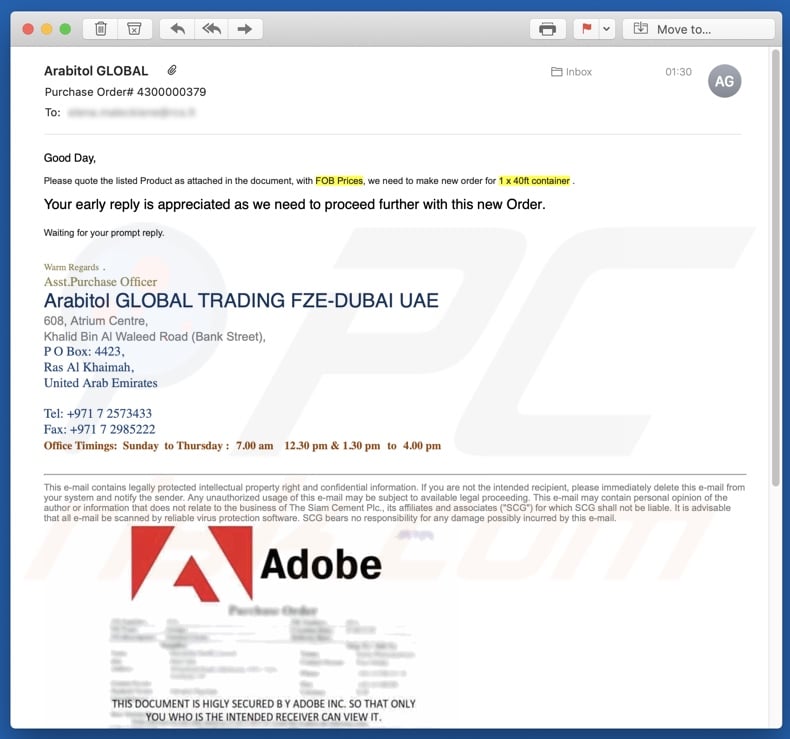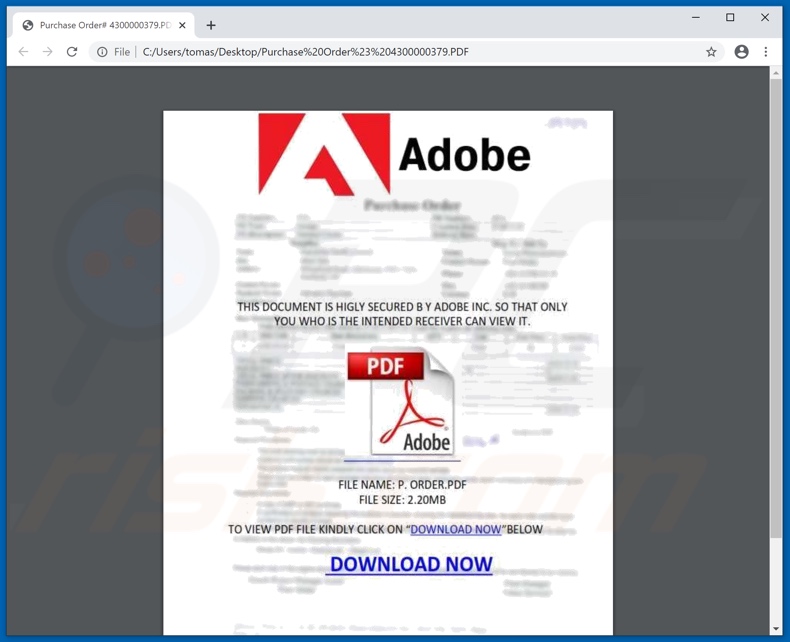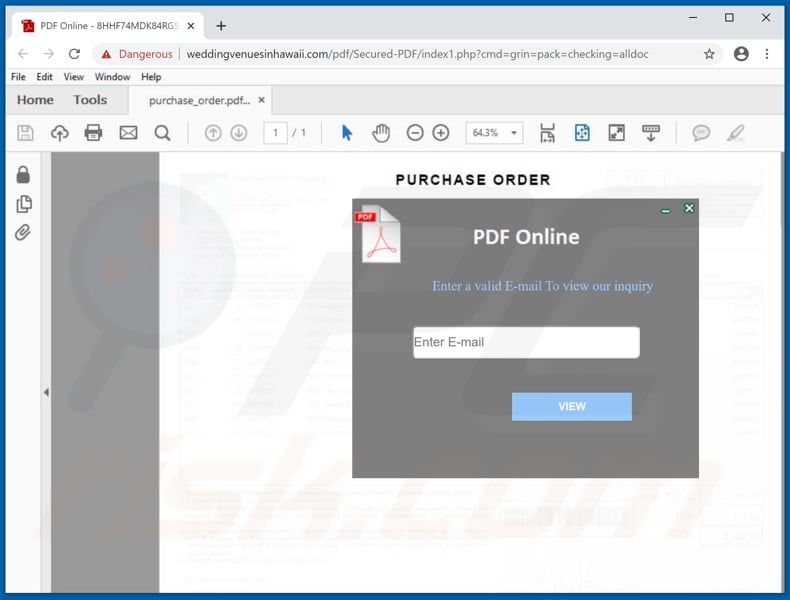Avoid having your email address stolen by the "Arabitol GLOBAL TRADING" email scam
Phishing/ScamAlso Known As: Arabitol GLOBAL TRADING spam
Get free scan and check if your device is infected.
Remove it nowTo use full-featured product, you have to purchase a license for Combo Cleaner. Seven days free trial available. Combo Cleaner is owned and operated by RCS LT, the parent company of PCRisk.com.
What is the "Arabitol GLOBAL TRADING" email?
"Arabitol GLOBAL TRADING" is a deceptive email claiming that recipients need to confirm a "new order". This is a phishing scam designed to steal recipients' email credentials (i.e., log-ins and passwords) thereby allowing scammers to gain full control over the email account. This could potentially endanger other accounts associated with the stolen email account.

The text presented in the "Arabitol GLOBAL TRADING" message provides no concrete information. This scam is often furthered by recipients' confusion and sense that it might lead to some financial gain or loss.
The email asks users to quote the product with the FOB (Fee On Board) as listed in the attachment, since the senders allegedly need to make a new order (1 x 40 ft container).
If received by owners of businesses dealing in sales, this may seem to be a beneficial deal, by which they have received a large order and the buyer will pay FOB (i.e., all shipping including product delivery to the port).
If, however, the message is received by users who do not work work for such a business, they might assume that there is large order of goods, for which they are somehow liable to pay. Regardless of the motivation, recipients can be tricked into opening the attachment to investigate, which will then lead them to the phishing site.
Furthermore, the email lists the fake sender's details and a disclaimer concerning the confidentiality of the order/information, which might enhance the perceived legitimacy of the message.
When the attachment is opened, it claims that the PDF document is supposedly secured by Adobe Inc. so that only the intended receiver can view it - therefore, they are urged to click the "DOWNLOAD NOW" button to view the document. This button leads to a website that continues the scam and asks users to enter their email address in the correct field to view the document.
Trusting this scheme can lead to more than just the loss of an email account. All connected accounts can also be compromised and stolen via the hijacked email account. For example, various communication and social networking, social media accounts can be received by the scammers behind "Arabitol GLOBAL TRADING" message.
These details can then be used to demand money from the contacts/friends lists, under the assumed identity of the user. Depending on the content stored, stolen file storage accounts can be used for blackmail purposes. E-commerce accounts (which often have credit card details saved) can be used by scammers to make various online purchases.
These are just some threats posed by the "Arabitol GLOBAL TRADING" scam. Should any attempts to log-in through the phishing website have already been made, you are strongly advised to immediately change the credentials of the email and all associated accounts. Contacting official support of potentially compromised accounts is also advised.
| Name | Arabitol GLOBAL TRADING Email Scam |
| Threat Type | Phishing, Scam, Social Engineering, Fraud. |
| Fake Claim | Scam claims recipients need to quote the product as listed in the attached document. |
| Detection Names (Purchase Order# 4300000379.PDF) |
ESET-NOD32 (PDF/Phishing.A.Gen), Cyren (PDF/Phish.BX), F-Prot (PDF/Phish.BX), SentinelOne (Static ML) (DFI - Suspicious PDF), Full List Of Detections (VirusTotal) |
| Symptoms | Unauthorized online purchases, changed online account passwords, identity theft, illegal access of the computer. |
| Distribution methods | Deceptive emails, rogue online pop-up ads, search engine poisoning techniques, misspelled domains. |
| Damage | Loss of sensitive private information, monetary loss, identity theft. |
| Malware Removal (Windows) |
To eliminate possible malware infections, scan your computer with legitimate antivirus software. Our security researchers recommend using Combo Cleaner. Download Combo CleanerTo use full-featured product, you have to purchase a license for Combo Cleaner. 7 days free trial available. Combo Cleaner is owned and operated by RCS LT, the parent company of PCRisk.com. |
"Arabitol GLOBAL TRADING" and other messages are sent during large scale spam email campaigns. These messages are usually presented as "official", "priority", "important", "urgent" and so on.
"Last Warning: Upgrade your email to avoid Shutting Down", "Roundcube Email Scam", "I Know A Lot More Things About You", and "I infected your computer with my private trojan" are some examples of other scams furthered via email. Phishing schemes are just one way in which these emails generate revenue for the scammers behind them.
They can request recipients to make fraudulent monetary transactions (e.g. pay fake fines, shipping, registration, subscription fees and other bogus payments), reveal personal information, pay a ransom to prevent publication of nonexistent compromising material, and so on. Spam campaigns are also used to proliferate Trojans, ransomware and other malware.
How do spam campaigns infect computers?
Infections often originate from dangerous files attached to deceptive emails. Alternatively, the messages can contain downloads links to the files. These files can be in various formats such as PDF and Microsoft Office documents, archive (ZIP, RAR) and executable (.exe, .run) files, JavaScript, etc.
When malicious files are executed, run or otherwise opened, the infection process starts (i.e., download/installation of malware). For example, Microsoft Office documents infect systems via malicious macro commands. Once opened, the docs request macros to be enabled (i.e., to enable editing) - the infection is then started.
Microsoft Office programs released prior to 2010 do not have "Protected View" mode and do not ask users to enable macro commands - therefore, they simply enable macros automatically when the document is opened.
How to avoid installation of malware
Do not open dubious or irrelevant emails, especially those received from unknown/suspicious senders. Furthermore, any attachments or links present in suspicious mail must not be opened, as doing so can result in high-risk infection. Use Microsoft Office versions released after 2010.
Other common malware proliferation methods are via illegal activation tools ("cracks"), fake updaters and untrusted download channels. Therefore, use official, verified download sources and activate/update products with tools/functions provided by genuine developers.
To ensure device and user safety, have a reputable anti-virus/anti-spyware suite installed and kept up to date. Use this software for regular system scans and removal of detected threats/issues. If you have already opened malicious attachments, we recommend running a scan with Combo Cleaner Antivirus for Windows to automatically eliminate infiltrated malware.
Text presented in the "Arabitol GLOBAL TRADING" email message:
Good Day,
Please quote the listed Product as attached in the document, with FOB Prices, we need to make new order for 1 x 40ft container .
Your early reply is appreciated as we need to proceed further with this new Order.
Waiting for your prompt reply.
Warm Regards .
Asst.Purchase Officer
Arabitol GLOBAL TRADING FZE-DUBAI UAE
608, Atrium Centre,
Khalid Bin Al Waleed Road (Bank Street),
P O Box: 4423,
Ras Al Khaimah,
United Arab Emirates
Tel: +971 7 2573433
Fax: +971 7 2985222
Office Timings: Sunday to Thursday : 7.00 am 12.30 pm & 1.30 pm to 4.00 pm
This e-mail contains legally protected intellectual property right and confidential information. If you are not the intended recipient, please immediately delete this e-mail from your system and notify the sender. Any unauthorized usage of this e-mail may be subject to available legal proceeding. This e-mail may contain personal opinion of the author or information that does not relate to the business of The Siam Cement Plc., its affiliates and associates ("SCG") for which SCG shall not be liable. It is advisable that all e-mail be scanned by reliable virus protection software. SCG bears no responsibility for any damage possibly incurred by this e-mail.
Purchase Order# 4300000379.PDF
Screenshot of the attachment within the "Arabitol GLOBAL TRADING" email ("Purchase Order# 4300000379.PDF"):

Screenshot of the phishing website:

Instant automatic malware removal:
Manual threat removal might be a lengthy and complicated process that requires advanced IT skills. Combo Cleaner is a professional automatic malware removal tool that is recommended to get rid of malware. Download it by clicking the button below:
DOWNLOAD Combo CleanerBy downloading any software listed on this website you agree to our Privacy Policy and Terms of Use. To use full-featured product, you have to purchase a license for Combo Cleaner. 7 days free trial available. Combo Cleaner is owned and operated by RCS LT, the parent company of PCRisk.com.
Quick menu:
- What is Arabitol GLOBAL TRADING spam?
- Types of malicious emails.
- How to spot a malicious email?
- What to do if you fell for an email scam?
Types of malicious emails:
![]() Phishing Emails
Phishing Emails
Most commonly, cybercriminals use deceptive emails to trick Internet users into giving away their sensitive private information, for example, login information for various online services, email accounts, or online banking information.
Such attacks are called phishing. In a phishing attack, cybercriminals usually send an email message with some popular service logo (for example, Microsoft, DHL, Amazon, Netflix), create urgency (wrong shipping address, expired password, etc.), and place a link which they hope their potential victims will click on.
After clicking the link presented in such email message, victims are redirected to a fake website that looks identical or extremely similar to the original one. Victims are then asked to enter their password, credit card details, or some other information that gets stolen by cybercriminals.
![]() Emails with Malicious Attachments
Emails with Malicious Attachments
Another popular attack vector is email spam with malicious attachments that infect users' computers with malware. Malicious attachments usually carry trojans that are capable of stealing passwords, banking information, and other sensitive information.
In such attacks, cybercriminals' main goal is to trick their potential victims into opening an infected email attachment. To achieve this goal, email messages usually talk about recently received invoices, faxes, or voice messages.
If a potential victim falls for the lure and opens the attachment, their computers get infected, and cybercriminals can collect a lot of sensitive information.
While it's a more complicated method to steal personal information (spam filters and antivirus programs usually detect such attempts), if successful, cybercriminals can get a much wider array of data and can collect information for a long period of time.
![]() Sextortion Emails
Sextortion Emails
This is a type of phishing. In this case, users receive an email claiming that a cybercriminal could access the webcam of the potential victim and has a video recording of one's masturbation.
To get rid of the video, victims are asked to pay a ransom (usually using Bitcoin or another cryptocurrency). Nevertheless, all of these claims are false - users who receive such emails should ignore and delete them.
How to spot a malicious email?
While cyber criminals try to make their lure emails look trustworthy, here are some things that you should look for when trying to spot a phishing email:
- Check the sender's ("from") email address: Hover your mouse over the "from" address and check if it's legitimate. For example, if you received an email from Microsoft, be sure to check if the email address is @microsoft.com and not something suspicious like @m1crosoft.com, @microsfot.com, @account-security-noreply.com, etc.
- Check for generic greetings: If the greeting in the email is "Dear user", "Dear @youremail.com", "Dear valued customer", this should raise suspiciousness. Most commonly, companies call you by your name. Lack of this information could signal a phishing attempt.
- Check the links in the email: Hover your mouse over the link presented in the email, if the link that appears seems suspicious, don't click it. For example, if you received an email from Microsoft and the link in the email shows that it will go to firebasestorage.googleapis.com/v0... you shouldn't trust it. It's best not to click any links in the emails but to visit the company website that sent you the email in the first place.
- Don't blindly trust email attachments: Most commonly, legitimate companies will ask you to log in to their website and to view any documents there; if you received an email with an attachment, it's a good idea to scan it with an antivirus application. Infected email attachments are a common attack vector used by cybercriminals.
To minimise the risk of opening phishing and malicious emails we recommend using Combo Cleaner Antivirus for Windows.
Example of a spam email:

What to do if you fell for an email scam?
- If you clicked on a link in a phishing email and entered your password - be sure to change your password as soon as possible. Usually, cybercriminals collect stolen credentials and then sell them to other groups that use them for malicious purposes. If you change your password in a timely manner, there's a chance that criminals won't have enough time to do any damage.
- If you entered your credit card information - contact your bank as soon as possible and explain the situation. There's a good chance that you will need to cancel your compromised credit card and get a new one.
- If you see any signs of identity theft - you should immediately contact the Federal Trade Commission. This institution will collect information about your situation and create a personal recovery plan.
- If you opened a malicious attachment - your computer is probably infected, you should scan it with a reputable antivirus application. For this purpose, we recommend using Combo Cleaner Antivirus for Windows.
- Help other Internet users - report phishing emails to Anti-Phishing Working Group, FBI’s Internet Crime Complaint Center, National Fraud Information Center and U.S. Department of Justice.
Share:

Tomas Meskauskas
Expert security researcher, professional malware analyst
I am passionate about computer security and technology. I have an experience of over 10 years working in various companies related to computer technical issue solving and Internet security. I have been working as an author and editor for pcrisk.com since 2010. Follow me on Twitter and LinkedIn to stay informed about the latest online security threats.
PCrisk security portal is brought by a company RCS LT.
Joined forces of security researchers help educate computer users about the latest online security threats. More information about the company RCS LT.
Our malware removal guides are free. However, if you want to support us you can send us a donation.
DonatePCrisk security portal is brought by a company RCS LT.
Joined forces of security researchers help educate computer users about the latest online security threats. More information about the company RCS LT.
Our malware removal guides are free. However, if you want to support us you can send us a donation.
Donate
▼ Show Discussion